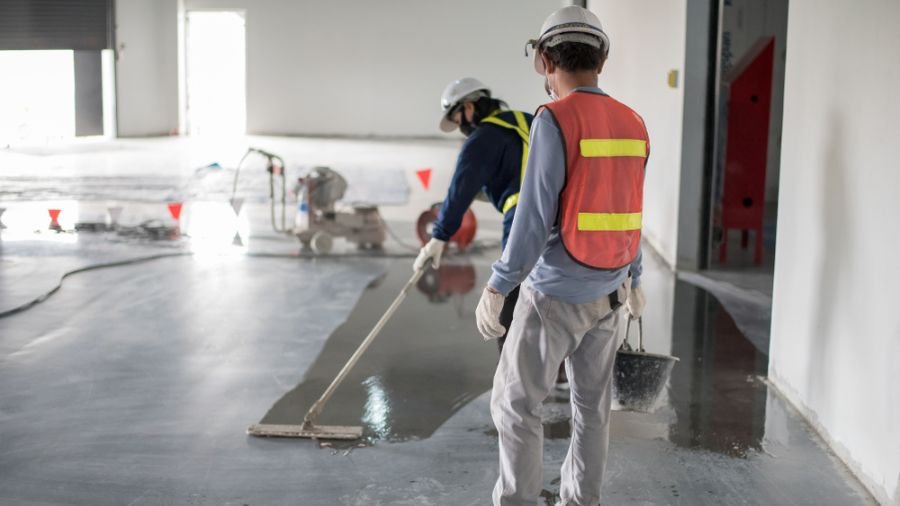Concrete Warehouse Flooring: A Durable and Cost-Effective Choice
Concrete warehouse flooring is a popular selection for a reason. It’s a highly durable, low-maintenance option that can withstand the wear and tear of heavy equipment and constant activity. In this blog post, we’ll delve into the specifics of concrete warehouse flooring, exploring its benefits, different types, and considerations for installation.
Benefits of Concrete Warehouse Flooring
- Durability: Concrete is incredibly strong and can handle heavy loads, making it ideal for warehouses that store and move large quantities of goods.
- Low Maintenance: Polished concrete requires minimal upkeep, reducing long-term costs. Regular sweeping, mopping, and occasional resealing (depending on the chosen finish) are typically sufficient.
- Cost-Effective: While the initial installation cost might be higher than some other options, concrete flooring offers a high return on investment due to its longevity and low maintenance needs.
- Versatility: Concrete can be finished in various ways to meet specific needs: polished for a smooth, reflective surface, stained for aesthetics, or treated with coatings for added chemical resistance.
- Fire Resistance: Concrete is naturally fire-resistant, providing an extra layer of safety in your warehouse.

Types of Concrete Warehouse Flooring
- Polished Concrete: This option offers a high-gloss, reflective finish that’s easy to clean and creates a bright, spacious feel. It’s suitable for light to medium-duty warehouses.
- Stained Concrete: Staining allows for customization of the concrete floor’s appearance while maintaining its inherent strength.
- Coated Concrete: A sealant or epoxy coating can be applied to enhance the concrete’s durability, chemical resistance, and slip resistance. This is ideal for heavy-duty warehouses or those storing chemicals.
Considerations for Installing Concrete Warehouse Flooring
- Subgrade Preparation: The underlying subgrade needs to be properly compacted and leveled to ensure a stable foundation for the concrete slab.
- Slab Thickness: The thickness of the concrete slab will depend on the anticipated weight loads it will need to bear. Consult a structural engineer for specific recommendations.
- Joint Placement: Expansion and contraction joints are crucial to prevent cracking in the concrete as it cures and expands and contracts with temperature changes.
- Surface Finish: Choose the finishing method (polishing, staining, coating) based on your desired aesthetics, functionality, and budget.
Conclusion
Concrete warehouse flooring offers a compelling combination of durability, affordability, and low maintenance. With proper installation and care, a concrete floor can last for decades, making it a wise investment for any warehouse owner. For further information on selecting the most suitable concrete solution for your specific warehouse needs, consulting with a professional concrete contractor is recommended.
FAQs
Q: Is concrete a good choice for all warehouses?
A: Concrete is a versatile option that works well for most warehouses. However, for facilities with very specific needs, such as cold storage or those storing highly corrosive chemicals, other flooring options might be better suited.
Q: How much does concrete warehouse flooring cost?
A: The cost of concrete warehouse flooring can vary depending on the size of the space, the thickness of the slab, and the chosen finish. Polished concrete is generally more expensive than stained or bare concrete. Consulting with a concrete contractor will give you a more accurate estimate for your specific project.
Q: How long does it take to install concrete warehouse flooring?
A: The installation time for concrete warehouse flooring depends on the size of the area and the chosen finishing method. Allowing proper curing time for the concrete is crucial, so factor that into your project timeline.
Q: How do I maintain concrete warehouse flooring?
A: Regular sweeping, mopping, and occasional resealing (depending on the finish) are typically enough to maintain concrete flooring. Spills should be cleaned up promptly to prevent staining. For specific maintenance recommendations, consult with your concrete contractor.
Q: Can I repair cracks in concrete warehouse flooring?
A: Yes, cracks in concrete warehouse flooring can be repaired using specialized materials and techniques. The severity of the crack will determine the appropriate repair method. Consulting with a concrete professional is recommended for crack repair.
Contact Us

- 135, Arjun Nagar, Kotla Mubarakpur, Opposite Defence Colony, New Delhi - 110003 (INDIA)
- + 91 11 41553830, 011 41553820
- info@jbaindia.com